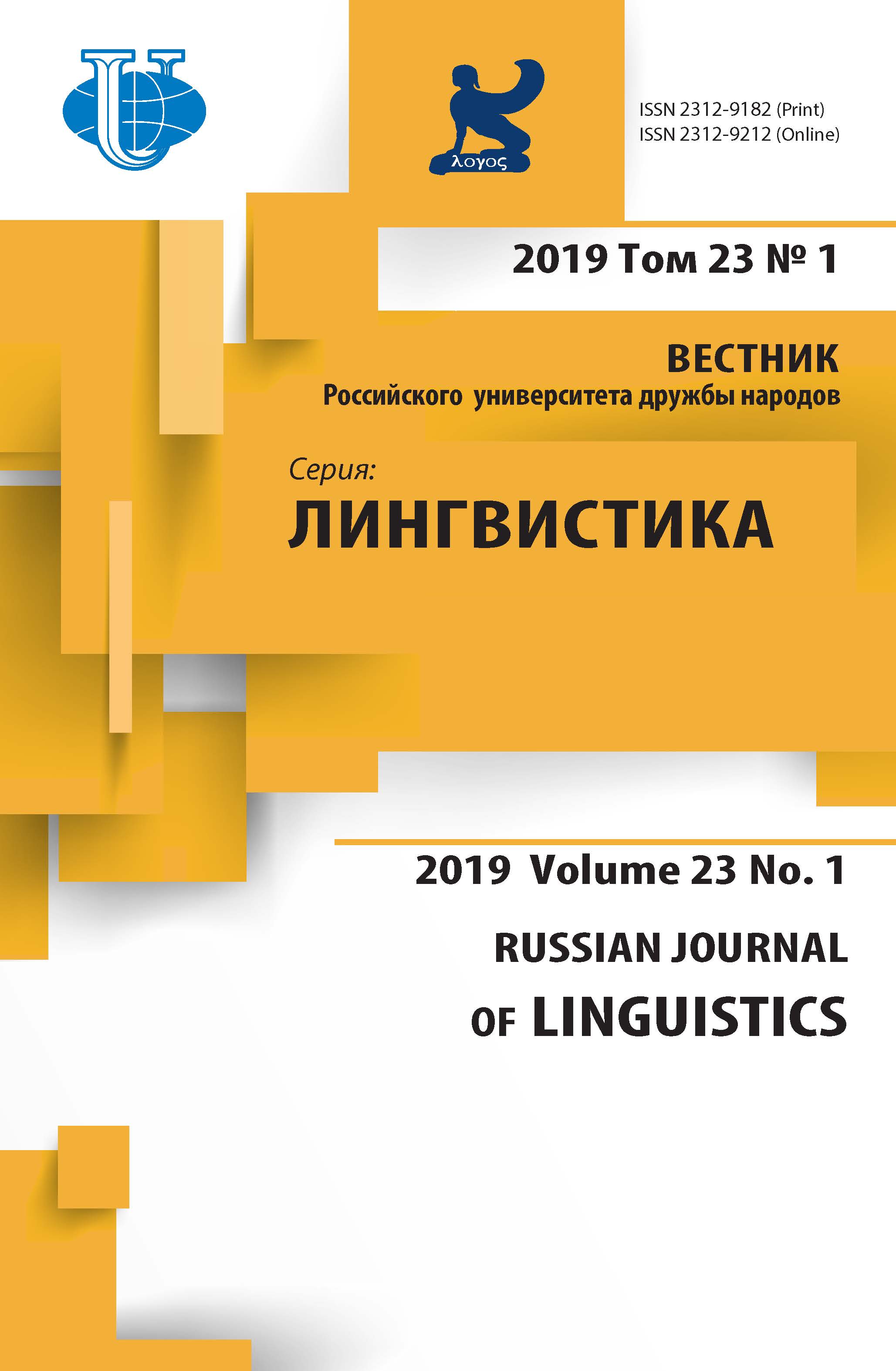Language Maintenance and Language Death: The Case of the Irish Language
- 作者: Pecnikova J.1, Slatinska A.1
-
隶属关系:
- Matej Bel University
- 期: 卷 23, 编号 1 (2019)
- 页面: 40-61
- 栏目: 社会语言学
- URL: https://journals.rudn.ru/linguistics/article/view/20615
- DOI: https://doi.org/10.22363/2312-9182-2019-23-1-40-61
如何引用文章
全文:
详细
According to the Constitution of Ireland (2018), the Irish language is the Republic’s national and first official language. In 2007 it was declared one of the official languages of the European Union, gaining a new status in comparison with the past when it was regarded as a Treaty language only. Since this adoption many changes have happened and many projects have been initiated in the field of maintenance and death prevention of the Irish language. The article analyses data gained from the qualitative research, the final part of which was carried out in the Republic of Ireland from February to March 2015 at the National University of Ireland in the city of Galway. The research sheds light on the future of the Irish language and reflects the opinions of informants on the topic of language death and language maintenance. Our aim was to obtain a most diverse sample of respondents with different attitudes towards the Irish language revitalization and its potential to be used as an effective tool within various spheres of life, ensuring the language´s vitality and protection from possible death. We highlight some of the most salient preventive measures, which seem to work in the area of language maintenance, including a huge role of particular organizations aimed at the Irish language revitalization. Last but not least, we pay attention to concerns about the language, which must be identified in order to find out which areas should be primarily addressed so as to protect the language for future generations.
作者简介
Jana Pecnikova
Matej Bel University
Email: jana.pecnikova@umb.sk
Ph.D., Assistant Professor at Matej Bel University, Faculty of Arts in Banska Bystrica, Slovakia Národná 12, Banska Bystrica, 974 01, Slovakia
Anna Slatinska
Matej Bel University
Email: anna.slatinska@umb.sk
Ph.D., Assistant Professor at Matej Bel University, Faculty of Arts in Banska Bystrica, Slovakia Národná 12, Banska Bystrica, 974 01, Slovakia
参考
- Aitchinson, J. (2001). Language Change. Process or Decay? Cambridge: Cambridge University Press.
- Amery, R. (2001). Language Planning and Language Revival. In Current Issues in Language Planning. Routledge, 141-221.
- Bačová, V. (1996). Etnická identita a historické zmeny. Bratislava: SAV.
- Benčiková, D. (2016). Cultural Intelligence in International Organizations. In: Foreign Languages and Cultures in Theory and Practice. Banská Bystrica: Belianum, 367-380.
- Boxer, D. (2002). Applying Socioliguistics. Domains and face-to-face interaction. Amsterdam: John Benjamins Publishing Comp.
- Corkery, D. (1954). The Fortunes of the Irish Language. Dublin: CRC.
- Edwards, J. (2001). The Ecology of Language Revival. In Current Issues in Language Planning. Routledge, 231-245.
- Gibbons, L. (1996). Transformations of Irish Culture. Cork: Cork University Press.
- Hindley, R. (2000). The Death of Irish Language. London: Routhledge.
- Höhn, E. (2011). The sociology of culture in the context of cultural regional development. In: Universities in Central Europe, 20 years after. Volume 1 : Transformations and states. Bruxelles: Bruylant, 225-235.
- Huťková, A. (2016). Jazyk ako prostriedok na vyjadrenia a formovanie identity. In Jazyky krajín V4 v súčasnej Európe: jazyk ako prostriedok na vyjadrenie a formovanie identity. Banská Bystrica: Belianum, 86-95.
- Mallory, P. J. (2013). The Origins of the Irish. London: Thames and Hudson.
- Millroy, J. (1992). Linguistic Variation and Change. Oxford: Blackwell.
- Nic Phaidin et al. (2008). A New View of the Irish Language. Dublin: Cois Life.
- Ó Cuív, É. (2008). Promoting the Irish Language Worldwide. In: Why Irish? Irish Language and Literature in Academia. Galway: Arlen House, 209-215.
- Ó Cuív, É. (2011). Irish in the 21st Century. In: American Journal of Irish Studies. New York: Glucksman Ireland House, 106-117.
- Ó Hifearnáin, T. (2008). Raising Children to be Bilingual in the Gaeltacht: Language Preference and Practice. In: International Journal of Bilingual Education and Bilingualism. 2008. vol. 10, no. 4, 510-528.
- Ó Laoire, M. (2012). Language policy and minority language education in Ireland: re-exploring the issues. In: Language, Culture and Curriculum. 2012. vol. 25, no. 1, 17-25.
- Ó Riain, S. (2010). Irish and Scottish Gaelic. A European Perspective. In: Naukovij visnik Volinskogo nacionaľnogo universitetu imeni Lesi Ukrainki. 2010, 262-267.
- Ó Riain, S. (2010). How a Member State can influence EU Language Policy? - The Case of the Irish Language. [online]. 2010. [cit. 2015-12-10]. Available on: http://www.docstoc.com/docs/ 47414367/THE-IRISH-LANGUAGE---DOC.
- Schmidt, C. L. (2001). Politics of Language: Conflict, Identity and Cultural Pluralism in Comparative Perspective. Cary NC: OUP.
- Slatinská, A., Pecníková, J. (2014). Globalizácia a fenomén minoritných jazykov. Prípad írskeho jazyka v Írskej republike. Podhájska: EEDA, 2014. 239-250.
- Slatinská, A. (2015). Írsky jazyk a kultúrna identita: revitalizácia a ochrana. Banská Bystrica: UMB.
- Slatinská, A., Pecníková, J. (2016). Irish Language through the Lens of Culture. In Languages in Dialogues of Cultures. Ufa: Bashkir State University, Ufa, 73-77.
- Slatinská, A. (2016). Socio-cultural Aspects of Irish Language Revitalization. In Formation and Transformation of Discourses. Samara: Samara National Research University, Samara, 81-87.
- Slatinská, A., Pecníková, J. (2017). Jazyk - kultúra - identita. Banská Bystrica: Belianum.
- Theimer, S. (2012). What Language Death and Language Planning Tell Us About MARC and RDA. In Journal of Library Metadata. Routledge, 279-293.
- Wardhaugh, R. (1993). Investigating Language: Central Problems in Linguistics. Oxford: Blackwell.
- Conradh na Gaelige. 2014. [online]. 2014. [cit. 2014-08-08]. Available on: https://cnag.ie/en/ campaigns.html.
- Údarás na Gaeltachta. 2013. [online]. 2013. [cit. 2013-10-12]. Available on: http://www.udaras.ie/ en/faoin-udaras/ar-rol.
- Year Strategy for the Irish Language 2010-2030. 2010. [online]. 2010. [cit. 2012.02.15]. Available on: http://www.ahg.gov.ie/en/20YearStrategyfortheIrishLanguage/Publications/20-Year%20Strategy%20-%20English%20version.pdf.














